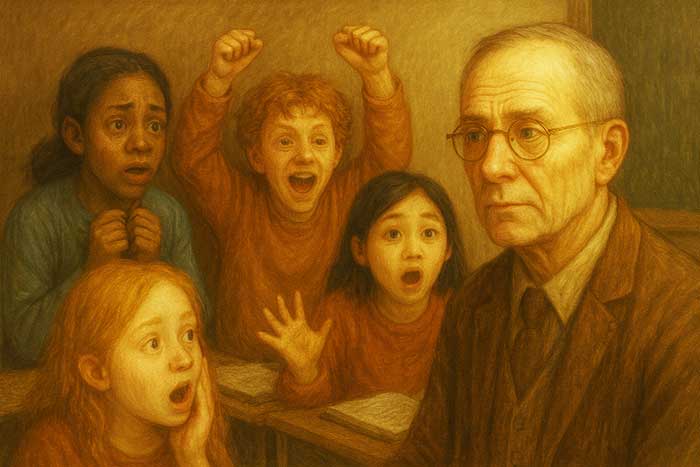Mr Smart liked rules. He liked quiet classrooms, clean desks, and students who did exactly what he said. The children in his class thought he was clever but also a little too strict. One Monday morning, Mr Smart surprised them. With a small smile, he said, “If everyone passes the test, you will make the rules for one whole week.”
The classroom became noisy at once. Some students laughed, others shouted, and a few looked worried. “Really, sir? “Any rules we want?” asked one boy. “Yes,” said Mr Smart. “But remember, everyone must pass.” The students nodded. They were all excited and nervous.
On Friday, the teacher gave back the test papers. To their amazement, every single student had passed. Some had studied hard, some were lucky, but it did not matter. A promise was a promise. Mr Smart clapped his hands. “Well done! Next week, the rules belong to you.”
The students quickly made their list. There were only four rules: no homework, phones allowed in class, teachers must bring snacks every day, and no tests—only games. They gave the list to Mr Smart, who read it carefully and nodded. “Very well. We will follow these rules.”
On Monday morning, the school felt like a party. Music played from someone’s phone, students ate crisps at their desks, and Mr Smart put a plate of biscuits on the table. Everyone laughed and shouted. “School is finally fun!” said one girl.
By Tuesday, things started to change. The floor was sticky with juice, the desks were dirty with food, and many students looked tired because they had stayed up too late playing on their phones. When Mr Smart tried to speak, nobody listened. “No lessons, sir! Only games!” shouted one boy.
By Wednesday, even the games were a problem. Students argued about who was winning, and some refused to play at all. The classroom was noisy and messy. Nobody was learning, and nobody was really happy.
Mr Smart never raised his voice. He never stopped them. He only watched with a small smile. By Friday, the students had had enough. Their clothes were untidy, their heads hurt, and the week felt like a failure. They went to Mr Smart and begged, “Please, can we have the old rules back?”
Mr Smart took off his glasses and looked at them. “Are you sure? You asked for freedom.” One girl said, “Yes, but too much freedom is not fun. We cannot work or even play like this.” The rest of the class agreed.
Mr Smart smiled. “Now you see. Rules are not just to stop you having fun; they are here to protect you.” The students nodded. The old rules returned, and life in the classroom became calm again. After that week, they still complained a little when Mr Smart gave homework—but much less than they had before.
📒 Key vocabulary
- strict – not easy, with many rules
- rules – things you must or must not do
- nod (nod, nodded, nodded) – move your head in agreement
- crisps – thin fried pieces of potato, eaten as a snack
- argue (argue, argued, argued) – talk angrily with someone
- refuse (refuse, refused, refused) – not agree to do something
- untidy – not neat or organised
- failure – when something does not work or is not successful
- beg (beg, begged, begged) – ask for something in a desperate way
- freedom – being free, not controlled by rules
🤔 Comprehension quiz
How much of this story did you understand? Test yourself with this easyEnglish quiz!


Leave a Reply